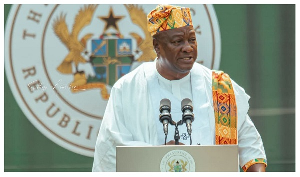President Nana Addo Dankwa Akufo-Addo says his administration is targeting a 40 per cent increase in enrollment of students into Tertiary Education.
He said 64 years after independence, the country still did not have the critical mass of tertiary education graduates that was required for its socio-economic transformation.
There was, therefore, the need to introduce measures to increase consciously the proportion of the population with relevant tertiary education to accelerate the transformation of the country.
The President said this during his State of the Nation Address (SONA) in Parliament on Tuesday.
He said focusing on Science, Technology, Engineering and Mathematics (STEM) related fields, with emphasis on engineering, could increase the enrollment ratio from the current 18.8 per cent to 40 per cent by 2030.
President Akufo-Addo said it would be achieved by significantly increasing enrollment in existing public and private universities and through the establishment of an “Open University” and that government expected increase record numbers of enrollment over the next four years.
He said the government would fulfil its campaign manifesto promise by removing the guarantor requirement that made it difficult for most students to apply for loans through the Student Loan Trust Fund programme.
The President said improving the quality of education and ensuring that students were globally competitive was to maintain the integrity of Ghana’s examinations and assessment system.
“A key objective of our effort to improve quality education and ensure that our students become globally competitive is to maintain the integrity of our examinations and assessment,” he said.
He added that Government, working through the West Africa Examination Council (WAEC), would introduce new measures to curb examination leakages and malpractices in the country’s educational system.
The President acknowledged that the teacher was at the centre of every reform in the field of education and that prioritising the welfare of teachers remained a key objective of the government.
He added that after the restoration of teacher training allowances, the Government was now paying professional allowances to both teaching and non-teaching staff.
President Akufo-Addo said Government was facilitating the acquisition of two hundred and eighty thousand laptops for members of the Ghana National Association of Teachers (GNAT), the National Association of Graduate Teachers (NAGRAT) and the Coalition of Concern Teachers (CCT) this year.
He said moving forward, the Minister for Education would detail an action plan for the implementation of the National Teacher Policy.
The President said as part of his commitment to the advancement of STEM education, Government would continue with the development of 20 STEM centres and eight model Science Senior High schools across the country.
He said the institutions would be fitted with state-of-the-art equipment and laboratories, which would facilitate teaching and learning in all areas, including artificial intelligence and robotics.
The President commended the Parliament of Ghana for passing the Education Regulatory Bodies’ Act, 2020 (Act 1023), adding, “The passage of this Act has established the Commission for Technical Vocational Education and Training (CTVET) and the TVET Service.”
He said the Act would help to streamline the delivery of TVET and avoid overlaps and duplication.
He said the government was also building 32 TVET institutions across the country to augment existing infrastructure for effective TVET delivery.
President Akufo-Addo stated that in line with his commitment to addressing the issue of youth unemployment through TVET, Government would commence the implementation of the Ghana Jobs and Skills project this year.
He said the project sought to expedite the development of competency-based training curricula on the National TVET Qualification Framework for 100 trades/professions from level one (National Proficiency 1) to level five (Higher National Diploma) as well as training some 25,000 beneficiaries and provide entrepreneurial support to about 50,000 individuals.
The President added that the project would also implement the Ghana Labour Market Information System and upgrade district public employment centres and services.
General News of Wednesday, 10 March 2021
Source: GNA
Government targets 40% increase in enrollment in Tertiary Education by 2030 - Akufo-Addo
Entertainment
















